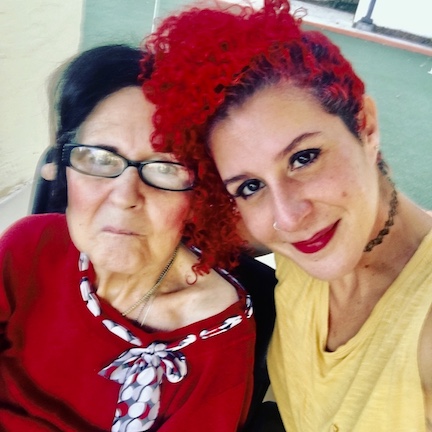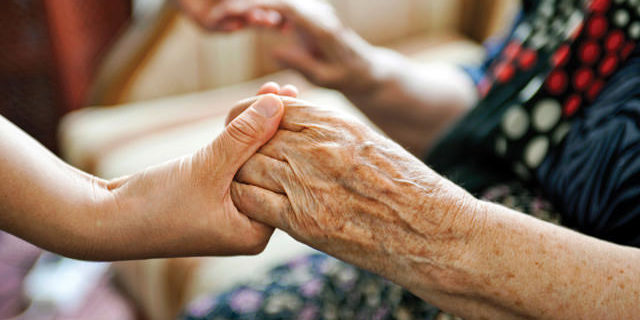I became a caregiver to my mother who was diagnosed with colon cancer the summer after I graduated from high school. It was devastating, isolating, overwhelming and even embarrassing at times to have a sick parent when all of my peer’s parents were healthy and thriving. But my experience was unusual for my generation. Now, statistics show that millennials make up close to 10 million of the 40 million caregivers in the U.S.. That’s 1 in 4 family caregivers! This is a vital, influential, and growing group of family caregivers that should not be overlooked. I am pleased to share this special guest article by Adrienne Glusman who shines a light on the struggles of millennial caregivers. -Kathi
The fastest growing generation of family caregivers come face to face with a new set of challenges (as if being a 20 or 30-something isn’t hard enough)
By: Adrienne Glusman
In 2011 my life was uprooted in an instant. The year before my mom had been diagnosed with Multiple System Atrophy. While hearing this diagnosis was scary, the reality of her first serious health incident brought on a new level of fear and uncertainty and launched me into the role of a Millennial Caregiver at 29. My own life was not exactly where I wanted/thought it would be at that point. I was on the brink of turning 30, trying to figure out “what I wanted to do when I grew up” and living out the single girl dating stories in NYC that made “Sex and the City” must-see TV. Now that was changing. As the only child of divorced parents, I knew caregiving would be bestowed on me one day, but I always imagined it would happen later in life—when I had a partner and family support system of my own. Now I felt like I was living a double life—this balancing act, where one minute I was living it up with friends and the next doing research or making phone calls or hardest of all, having to make executive decisions for the wellbeing of my mom. The caregiving roles had come full circle—I was now a mother to my mom.

No matter the generation, caregiving is physically, mentally and emotionally taxing. It’s common to think of caregiving when you’re middle aged or older but as millennials, we are emerging as the new generation of family caregivers. But caregiving is coming at a pivotal time in our lives and is derailing expected milestones like getting married, having kids and purchasing a first home. These things are being eclipsed as we are making crucial decisions about our loved one’s life while at the same time, still trying to figure out our own.
We are in the middle of a giant societal change. Millennials now make up 24% of the nation’s unpaid caregivers, up from 22% of young adult caregivers in 2009, according to the National Alliance for Caregiving. According to AARP, the age of young caregivers in 2014 between 18-34 was 24%, compared to the 34% of those caregivers aged 50-64. These numbers are expected to grow and so to are the challenges, some of which I’ve listed below:
1. Isolation
We are a hidden population. We often feel isolated as any caregivers we may know are older, in different stages of their lives, and just wouldn’t understand the complexities of caregiving coupled with where we are in life. We may have great friends willing to listen and lend a helping hand, but none of them are in a similar situation and just don’t “get it.”
2. Building a Solid foundation for Ourselves
Our loved one becomes our first priority when we step into caregiving, so oftentimes time and money allocated to helping them can cause our education, career path, financial stability and overall wellbeing to take a backseat. It’s really hard to take big life steps when you’re caregiving because you just never know when the shoe will drop. It eventually takes its toll trying to juggle work, dating, social interactions, self-care and caregiving—something always has to give.
3. A Lack of Resources That Speaks to Our Generation
We are the rapidly growing generation of caregivers, yet companies in the aging space have yet to make a shift and start marketing to us. Marketing campaigns, ads, resources—everything targets an older generation of family caregivers. As a result, we feel lost, rudderless, and confused about where to go, what to do, and what next step to take.
The millennial caregiving journey is a labyrinth of unexpected twists and turns—some days you’re strong, some days you are just getting by and others you are on the bathroom floor crying and trying to make sense of it all. If you are a millennial caregiver looking for support – you are seen, you are heard and most of all you are not alone. I welcome you to follow me @journeyedcaregiver on Instagram and Facebook where I’m fostering a space for like minded millennial caregivers. One thing is for certain—we didn’t choose this life, it chose us and we are struggling daily to do the best we can with it.
Thank you for reading and I look forward to talking more with Adrienne on a future Care for Caregivers podcast! -Kathi
To make an online donation to The Kathi Koll Foundation, please click here.


